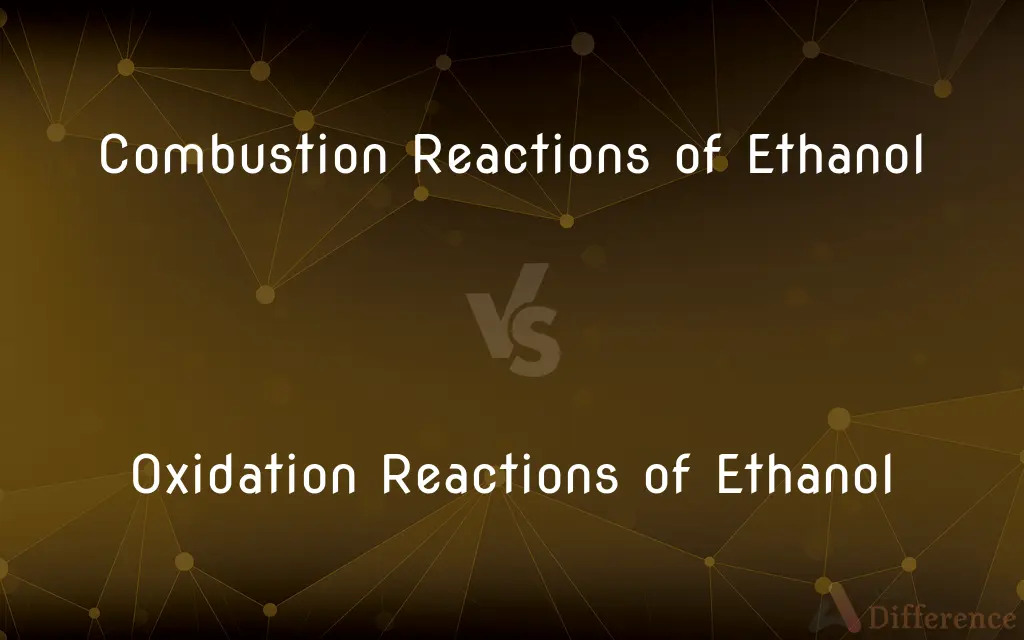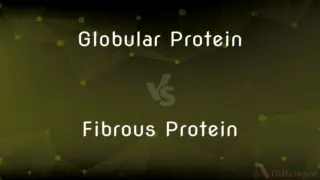Combustion Reactions of Ethanol vs. Oxidation Reactions of Ethanol — What's the Difference?
By Tayyaba Rehman — Published on January 2, 2024
Combustion reactions of ethanol involve burning in oxygen to produce carbon dioxide and water. Oxidation reactions of ethanol result in products like acetaldehyde without complete burning.

Difference Between Combustion Reactions of Ethanol and Oxidation Reactions of Ethanol
Table of Contents
ADVERTISEMENT
Key Differences
Combustion reactions of ethanol are a specific type of chemical reaction where ethanol is burned in the presence of an oxidizing agent, usually atmospheric oxygen. When this occurs, the ethanol is completely converted into carbon dioxide and water, releasing energy in the process. This type of reaction is exothermic and is the reason ethanol is used as a fuel in certain applications.
On the other hand, oxidation reactions of ethanol refer to the chemical reactions where ethanol is oxidized but not necessarily burned. In these reactions, ethanol can be converted into various products depending on the conditions and the oxidizing agent. One common product of the oxidation of ethanol is acetaldehyde.
Combustion reactions of ethanol are typically complete reactions that yield the maximum amount of energy from ethanol. They're the reason behind the flame when ethanol burns and are used in various applications where heat or energy is required. These reactions need a sufficient amount of oxygen and are usually characterized by the presence of a flame.
Conversely, oxidation reactions of ethanol might not involve flames. They can occur under various conditions, including enzymatic reactions in the human body. While combustion reactions of ethanol release energy primarily as heat and light, oxidation reactions can be part of more complex biochemical pathways or industrial processes.
Comparison Chart
Nature of the reaction
Complete burning in oxygen
Partial or complete oxidation without burning
ADVERTISEMENT
Major Products
Carbon dioxide and water
Products like acetaldehyde or others depending on conditions
Energy Release
Exothermic; produces heat and light
May or may not release significant energy
Presence of Flame
Usually characterized by a flame
Doesn't necessarily involve a flame
Applications
Used as fuel in heating, engines, etc.
Involved in biochemical pathways, industrial processes, etc.
Compare with Definitions
Combustion Reactions of Ethanol
Combustion reactions of ethanol are exothermic reactions where ethanol burns to produce carbon dioxide and water.
When ethanol is burned in air, it undergoes a combustion reaction producing a blue flame.
Oxidation Reactions of Ethanol
Oxidation reactions of ethanol involve the loss of electrons or increase in oxidation state of ethanol.
In the liver, oxidation reactions of ethanol convert it to acetaldehyde.
Combustion Reactions of Ethanol
Combustion reactions of ethanol release energy primarily as heat and light.
Lighting a spirit lamp demonstrates the combustion reactions of ethanol as it emits heat and light.
Oxidation Reactions of Ethanol
Oxidation reactions of ethanol can result in various products based on conditions and agents.
In the presence of certain bacteria, oxidation reactions of ethanol produce acetic acid.
Combustion Reactions of Ethanol
Combustion reactions of ethanol are fundamental in applications where ethanol is used as a fuel.
In ethanol fireplaces, the combustion reactions of ethanol create a cozy ambiance by producing a flame and warmth.
Oxidation Reactions of Ethanol
Oxidation reactions of ethanol can be part of biochemical or industrial pathways.
In the production of vinegar, oxidation reactions of ethanol are essential.
Combustion Reactions of Ethanol
Combustion reactions of ethanol require a sufficient amount of oxygen to proceed completely.
In a limited oxygen environment, the combustion reactions of ethanol may produce carbon monoxide.
Oxidation Reactions of Ethanol
Oxidation reactions of ethanol can occur without the presence of flames.
In enzymatic reactions, oxidation reactions of ethanol happen at body temperature without burning.
Combustion Reactions of Ethanol
Combustion reactions of ethanol involve the complete oxidation of ethanol in the presence of oxygen.
In engines, the combustion reactions of ethanol provide the energy to move the pistons.
Oxidation Reactions of Ethanol
Oxidation reactions of ethanol might not fully convert ethanol to carbon dioxide and water.
During fermentation, oxidation reactions of ethanol produce other alcohols and compounds.
Common Curiosities
What are combustion reactions of ethanol?
Combustion reactions of ethanol involve the complete burning of ethanol in oxygen to produce carbon dioxide and water.
Can combustion reactions of ethanol occur without oxygen?
No, combustion reactions of ethanol require oxygen, typically from the air, to proceed.
Why do combustion reactions of ethanol produce a flame?
They release energy in the form of heat and light, which manifests as a flame.
What color is the flame in combustion reactions of ethanol?
The flame is typically blue, indicating complete combustion.
How do oxidation reactions of ethanol differ from combustion?
Oxidation reactions of ethanol refer to the chemical conversion of ethanol through electron loss, which may not involve complete burning.
What's a common product of the oxidation reactions of ethanol?
A common product is acetaldehyde, especially in biochemical pathways.
Can oxidation reactions of ethanol produce acids?
Yes, for example, oxidation can lead to acetic acid in some conditions.
Are oxidation reactions of ethanol always slow?
No, the speed of oxidation reactions of ethanol varies depending on the conditions and oxidizing agents.
Can oxidation reactions of ethanol occur in the human body?
Yes, for instance, the liver oxidizes ethanol to acetaldehyde.
Are combustion reactions of ethanol safe for indoor use?
When controlled, such as in ethanol fireplaces, they can be safe, but proper ventilation is crucial.
Do all oxidation reactions of ethanol need external agents?
No, some can occur spontaneously under certain conditions, while others need specific agents.
Is energy always released in combustion reactions of ethanol?
Yes, these reactions are exothermic, releasing energy as heat and light.
What’s the main byproduct of combustion reactions of ethanol?
The main byproducts are carbon dioxide and water.
Why is it important to distinguish between combustion and oxidation reactions of ethanol?
Understanding the difference helps in various applications, from energy production to biochemical processes.
Why are oxidation reactions of ethanol important in industry?
They're vital in producing various chemicals and in processes like vinegar-making.
Share Your Discovery

Previous Comparison
Structure vs. Class
Next Comparison
Globular Protein vs. Fibrous ProteinAuthor Spotlight
Written by
Tayyaba RehmanTayyaba Rehman is a distinguished writer, currently serving as a primary contributor to askdifference.com. As a researcher in semantics and etymology, Tayyaba's passion for the complexity of languages and their distinctions has found a perfect home on the platform. Tayyaba delves into the intricacies of language, distinguishing between commonly confused words and phrases, thereby providing clarity for readers worldwide.














































